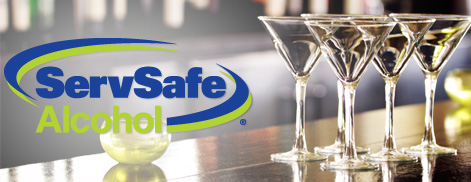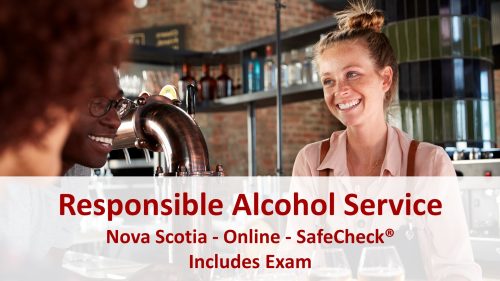How to Get the servsafe food handlers card and Why It’s Important for Food Service Jobs
How to Get the servsafe food handlers card and Why It’s Important for Food Service Jobs
Blog Article
Master Liable Alcohol Solution With Comprehensive Certification Programs
The mastery of responsible alcohol solution is not merely a governing need; it is a basic aspect that boosts the track record and operational stability of establishments within the hospitality sector. Comprehensive certification programs supply vital insights into neighborhood laws, reliable intervention methods, and consumer engagement approaches. By purchasing these training campaigns, companies can cultivate a culture of obligation amongst their team, mitigating risks and improving consumer contentment. The path to reliable implementation and its long-term benefits might not be as uncomplicated as it appears. What challenges lie ahead for those who look for to boost their service requirements?

Value of Responsible Alcohol Solution
Responsible alcohol service is important to advertising public health and wellness and safety in facilities that serve alcoholic drinks. It encompasses a series of practices made to stop the overconsumption of alcohol, minimize the risk of alcohol-related damage, and make certain a risk-free setting for patrons and personnel alike. By upholding accountable service criteria, establishments can alleviate possible events of drunkenness, which might result in crashes, physical violence, or other adverse results.
Furthermore, responsible alcohol service enhances the overall customer experience. Additionally, establishments that stick to liable solution techniques often experience lower insurance premiums and reduced lawful responsibilities.
Moreover, carrying out liable alcohol solution methods lines up with wider public health initiatives targeted at lowering chemical abuse and promoting area wellness. This aggressive technique not only safeguards individual clients yet likewise adds to a healthier society. Ultimately, liable alcohol solution is not simply a legal commitment; it stands for an ethical commitment to the health of consumers and the area at big.
Key Elements of Accreditation Programs
Certification programs for accountable alcohol service normally include a number of essential parts designed to gear up staff with the needed skills and understanding to serve alcohol securely. These programs usually include detailed training on neighborhood and state alcohol laws, making certain that participants understand their legal commitments and the effects of failing to conform.
One more important component is the identification of indicators of drunkenness - servsafe food handlers card. Staff are trained to recognize behavioral hints suggesting when a client might be over-served, allowing them to intervene appropriately
Furthermore, reliable interaction approaches are stressed, teaching staff how to engage with customers in a manner that advertises liable alcohol consumption. This consists of training in problem resolution strategies, permitting team to manage tight spots steadly and properly.
Furthermore, programs often integrate useful scenarios and role-playing exercises, providing individuals with real-life instances to exercise their skills. Finally, continuous education and learning and resources are important for maintaining knowledge and abilities gradually, as guidelines and finest methods develop. Together, these elements develop a comprehensive structure that equips personnel to foster a more secure drinking environment while decreasing obligation for establishments.
Advantages for Personnel and Facilities
Personnel and facilities alike gain considerable gain from getting involved in accountable alcohol solution certification programs. For personnel, these programs improve knowledge and skills associated with alcohol solution, equipping them to determine indicators of drunkenness and implement effective treatment approaches. This training not just cultivates check over here a feeling of self-confidence amongst staff members yet also promotes a society of security and responsibility in the work environment.
For establishments, purchasing certification programs can cause decreased obligation and fewer occurrences related to over-serving. By making certain that staff are trained in liable service methods, facilities can mitigate dangers connected with alcohol-related incidents, thus shielding their track record and financial stability. Many jurisdictions use motivations, such as reduced insurance premiums, for certified establishments.
Furthermore, carrying out qualified techniques can boost consumer contentment and loyalty. Clients are most likely to return to locations that prioritize their safety and wellness. Eventually, a dedication to accountable alcohol service not just grows a positive atmosphere however likewise boosts the general operational effectiveness of facilities, making it a smart financial investment for long-term success in the friendliness industry.
Typical Obstacles in Alcohol Service
Ensuring effective alcohol service is not without its difficulties, also in facilities dedicated to accountable practices. One significant obstacle is the demand for personnel to accurately assess customers' alcohol usage levels. servsafe food handlers card. This requires an eager understanding of exactly how various factors, such as food consumption, tolerance, and individual distinctions, influence intoxication
In addition, the stress to take full advantage of sales can contravene responsible solution protocols. Staff members might face troubles in declining solution to inebriated individuals, specifically in social atmospheres where peer pressure and assumptions are prevalent.
An additional difficulty is remaining updated with neighborhood legislations and regulations regarding alcohol service. Conformity is essential, yet regular changes in regulations can create confusion and might result in inadvertent offenses.
Training programs might not always cover the subtleties of real-world circumstances, leaving personnel unfit to handle complicated situations. Inconsistent interaction between monitoring and employees relating to assumptions for responsible service can better intensify these problems.
To browse these challenges successfully, facilities must promote an environment of support, highlighting the relevance of responsible service while supplying the essential tools and training for staff to do well.
Steps to Acquire Qualification
To obtain Responsible Alcohol Service Accreditation, candidates commonly begin by researching the particular demands mandated by their neighborhood regulatory authorities. These requirements may vary substantially relying on the area, so it is necessary to familiarize oneself with the relevant laws and regulations.

After selecting a program, applicants have to complete the requisite training, which usually covers topics such as recognizing intoxication, comprehending lawful obligations, and applying techniques for liable service. Participants need to proactively engage with the product, as this knowledge is important for reliable alcohol service.

Complying with training, prospects commonly take an evaluation to examine their understanding of the product. Effective completion of this assessment leads to accreditation.
Verdict
Finally, understanding accountable alcohol service through comprehensive accreditation programs is crucial for advertising safety and enhancing client experiences within the hospitality market. By outfitting staff with the essential understanding and skills, establishments not only reduce dangers related to overconsumption and legal obligations however likewise cultivate a culture of responsibility. This commitment to responsible service ultimately leads to raised consumer commitment and functional success, strengthening the significance of ongoing training and adherence to alcohol service criteria.
Report this page